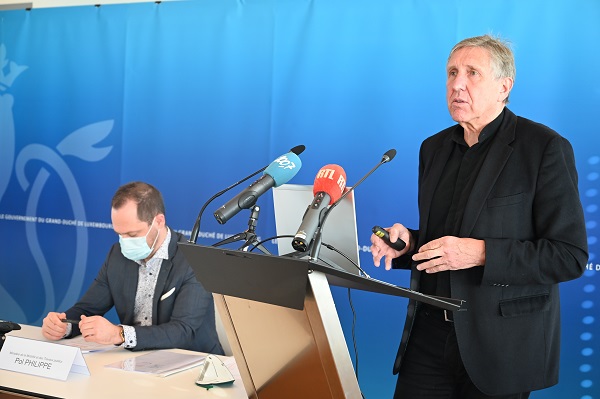 L-R: Pol Philippe, Ministry of Mobility and Public Works; François Bausch, Deputy Prime Minister, Ministry for Mobility and Public Works;
Credit: MMTP
L-R: Pol Philippe, Ministry of Mobility and Public Works; François Bausch, Deputy Prime Minister, Ministry for Mobility and Public Works;
Credit: MMTP
On Tuesday 11 January 2022, Luxembourg's Deputy Prime Minister and Minister for Mobility and Public Works, François Bausch, presented draft Grand-Ducal regulations aimed at updating company car benefit schemes to encourage the use of zero or low CO2 emission vehicles.
As part of the integrated national energy and climate plan and with a view to achieving a rate of 49% of electric cars in the national vehicle fleet by 2030, these draft regulations propose an adaptation of category M1 company cars (with zero or low CO2 emissions) owned or hired / leased by the employer and made available to an employee, at least partially, for non-professional purposes.
According to the National Society of Automotive Traffic (Société nationale de circulation automobile - SNCA), 443,301 cars (M1) were registered in Luxembourg on 1 January 2022. Around 40,000 to 50,000 of these cars could be considered as company cars, falling under the current benefit scheme.
Until the 2017 tax reform, a single rate of 1.5% of the new value of the car (including VAT) was applied for company vehicles. Since 2017, this rate has been calculated according to the type of engine and CO2 emissions. From the year 2020, the rate is calculated based on the Worldwide Harmonised Light Vehicle Test Procedure (WLTP) values, which applies to cars with combustion engines with CO2 emission values which are on average approximately 20% higher compared to the old New European Driving Cycle (NEDC) test cycle.
Over the past three years, a total of around 11,000 company cars have been registered annually. The number of company cars with zero or low CO2 emissions has increased significantly in the vehicle fleet in Luxembourg. However, the vast majority of new registrations still present CO2 emissions levels above 110 g / km. According to the Ministry of Mobility and Public Works, whilst the figures generally show that a company car fleet produces progressively less CO2 emissions, the current benefit scheme remains attractive for vehicles with high emission levels. Consequently, it is deemed necessary to adapt the system in force so that in the short term, only company cars with zero or low emissions are tax-advantaged.
The ministry explained that due to long and uncertain delivery times, the current system of calculating benefits remains applicable for new leasing contracts concluded until 31 December 2021. This system will also be applied throughout 2022. The new system will be applied from 2023; this will apply for leasing contracts concluded until the end of 2024 provided that the vehicle registration takes place before 31 December 2025.
Concretely, a new system for calculating benefits according to the type of engine and CO2 emissions will be implemented so that the rate is increased by 0.2% for the most categories of cars with CO2 emissions greater than 80 g / km. For cars belonging to emission categories less than or equal to 80 g / km, there will be no adjustment of the rates currently applicable. The maximum rate of 1.8% will apply to company cars with CO2 emissions exceeding 130 g / km (currently 150 g / km). This maximum rate corresponds approximately to the average threshold from which a company car is no longer financially advantageous for the employee compared to an acquisition of the car in his / her own name or under private leasing.
For cars with zero CO2 emissions, namely pure electric cars and hydrogen-powered fuel cell electric vehicles, a minimum rate of 0.5% is maintained. However, the rate of 0.5% will only be applicable for cars with low electrical energy consumption (i.e. less than or equal to 18 kWh / 100km). This adaptation is similar to the modulation of purchase bonuses for pure electric cars introduced in April 2021.
For company cars newly registered from 1 January 2025 and for which no contract will be signed before 31 December 2024, the flat-rate benefit scheme will be simplified and particularly favourable to cars with zero CO2 emissions. The rate of 0.5% will no longer be applicable and so a rate of 1% will be set for pure electric cars whose electric energy consumption does not exceed 18 kWh / 100km and for fuel cell electric vehicles. For models of electric company cars whose electric power consumption is greater than 18 kWh / 100km, a rate of 1.2% will be prescribed.
With regard to other engines, including among others those using petrol, diesel, compressed natural gas (CNG), liquefied petroleum gas (LPG) and all hybrid and plug-in hybrid engines with a thermal engine, the rate for the calculation of the monthly value will be set at 2%. According to the ministry, this is in order to encourage the employee to opt for a company car with zero CO2 emissions.








